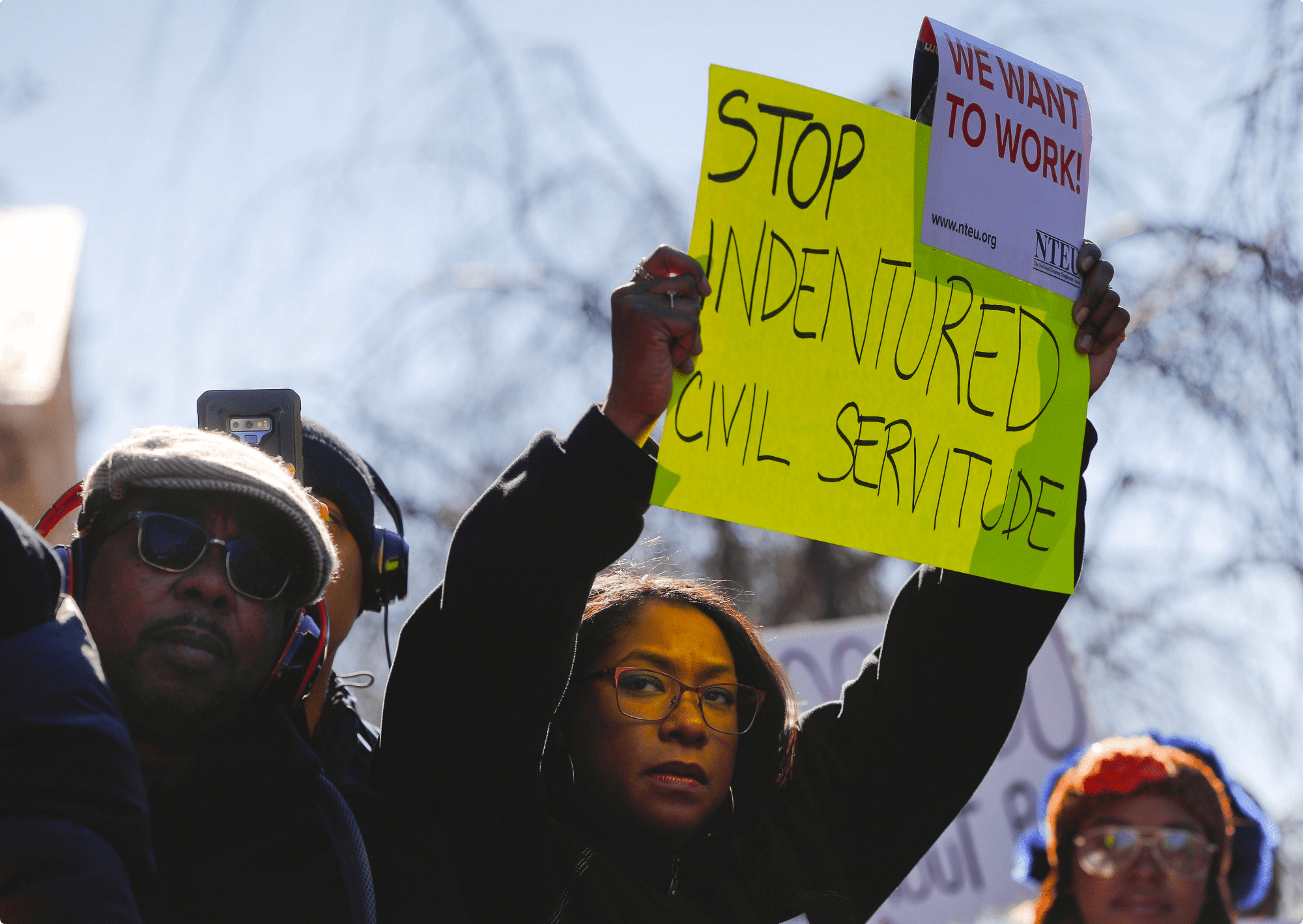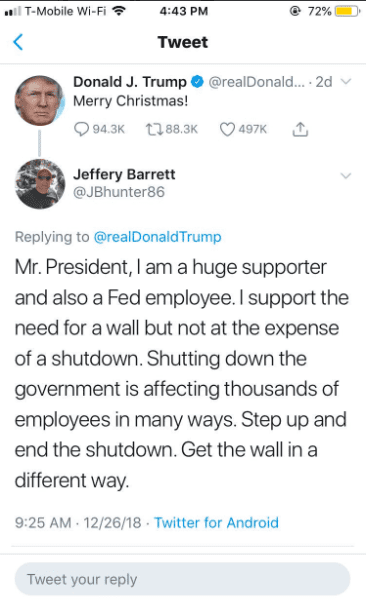#ShutdownStories and the Federal Employee Takeover of Social Media
FEBRUARY 14, 2019 | COWORKER.ORG

During the longest-ever federal government shutdown that began in December 2018, an unprecedented number of federal employees used social media to share their stories with the public, and pressure elected leaders to take action. These stories — often heartwrenching portraits of hardship and hard choices — generated a massive amount of attention from mainstream media outlets and galvanized public support for civil servants and government contractors.
Sites like Twitter, Facebook, Instagram, Reddit and others enabled workers across the country to talk to each other and share ideas and solutions. Through social media, federal workers and contractors spoke directly to policymakers and the public; volunteers and community allies were able to coordinate and find ways to help; and journalists were able to find powerful spokespeople for how the shutdown was impacting people’s lives.
Storytelling
Some of the most ‘viral’ moments of the shutdown came from federal workers who used social media to tell the story of their hardships, often using the popular hashtag #shutdownstories.
MJ is a single parent, so losing her only source of income added a hardship, but the fear overflowed into impacting her children.
I am a single mother of 3 with no help. Not knowing if I can pay rent or feed my family next week is hard and all that’s on my mind this day of Christmas when I should be happy. My kids feel my anxiety too ???? #ShutdownStories
— mj4ever (@mj4ever) December 25, 2018
A 30-year civil servant in California was forced to consider whether she could continue to employ for her husband’s caregiver.
I’ve been a loyal, dedicated federal employee for almost 30 years. I ❤️ my work. I may have to terminate my husband’s caregiver because it’s so expensive, it’ll rip through any savings we have very quickly. I’m besides myself with worry this Christmas. #ShutdownStories
— AltCivilServant ✊????????????✊????????????????????????????????✌???? (@AltCivilServant) December 25, 2018
Maria worried how her family would be able to survive after Christmas when her law enforcement husband had to return to work without pay. For families that just put some of their holiday gifts on credit cards, the shutdown couldn’t have come at a worse time.
My husband is federal law enforcement. He had the weekend off but now has to head back to work on Christmas morning with no indication of when/if he will be paid for providing crucial border security. We blame you @realDonaldTrump #ShutdownStories #TrumpShutDown
— Maria Ortega (@shamapoo) December 25, 2018
Alfreda Dennis-Bowyer told CNN that she had savings and was in a comfortable position that she could sustain her life despite the shutdown. Her younger colleagues, on the other hand, had a tougher time.
She explained that those who were just starting out in life have student loans and young families with daycare to contend with.
“We’re real people and I don’t feel like he’s in touch with the reality of how people live day to day, week to week, check to check, “ she said. “He’s not looking at the big picture.”
Once the shutdown entered its third and fourth week, and it seemed there was no end in sight, the stories became more desperate. Journalists often followed up with feds on Twitter and other social media outlets, requesting interviews. Television news interviews allowed federal workers to explain the lengths they were forced to go to stay afloat.
Mallory Lorge of River Falls, Wisconsin revealed she was forced to begin rationing her insulin to treat her high blood sugar. Her insurance requires a $300 co-pay to purchase her insulin and she said that their family couldn’t afford it. She began skipping injections after meals and at one point removed her insulin pump out of fear.
“I can’t afford to go to the ER. I can’t afford anything. I just went to bed and hoped I’d wake up,” she said in an interview with CNN. “The thought of having more debt was scarier than the thought of me maybe dying in my sleep.”
She explained that she didn’t even tell her husband about the rationing of insulin because she didn’t want him to worry.
It was through her online community of fellow diabetics that her story began to spread. Members of the group offered to send her their excess insulin, which she gladly accepted. When her story was escalated to the national news, others from Wisconsin and around the country pitched in to help.
Connecting
Federal workers also used social media to connect with lawmakers, the president’s staff and other workers around the country. In Washington, DC, for example, federal employees used the local community subreddit to discuss how they were spending their day.
Someone — most likely a furloughed federal employee — created a massive Google doc, which listed all the discounts, special events, and services available to federal workers and contractors impacted by the shutdown.
During the 2013 shutdown, Facebook groups popped up for federal workers to coordinate and commiserate. This time, Facebook was a place where people worked to find services and volunteers worked to help.
Trash at national parks began overflowing, so volunteers coordinated on Facebook to do their part to keep the parks clean.
Thoughtful citizens stepped up to find people in their community who could donate food, household items, as well as supplies for babies and children. Using local Facebook groups, Cristina Walkley explained she saw it as part of her job as an admin to help. One of the major things she hoped to do was let federal workers know they weren’t alone and people cared enough to check on them.
“I think it’s our job as a community member, as a human being, to check on our neighbors and say, ‘Hey, how are you doing?’” she said. “Sometimes that’s all it takes. ‘Is there anything you need?’”
Another emotional piece of the equation was the need for angry Americans to vent at the president and his staff. @OKCatMom saw senior White House aide Ivanka Trump boast about the economy and used Twitter to share her response.
After President Trump made remarks about federal workers being “more than happy to do their part” to fund the border wall, reporter Matt Laslo asked for federal workers to contact him if they agreed. Out of the 800,000+ workers, Laslo said he heard from about one dozen.
“Mr. President, I am a huge supporter and also a Fed employee,” tweeted Jeffrey Barrett. “I support the need for a wall but not at the expense of a shutdown. Shutting down the government is affecting thousands of employees in many ways. Step up and end the shutdown. Get the wall in a different way.”

CBS News correspondent David Begnaud also put out a call on social media for shutdown stories. He was flooded with stories on social media of single parents struggling, essential employees forced to spend money to travel to work when they still weren’t being paid. Begnaud reposted each heartbreaking tale, using the #ShutdownStories hashtag.
One such story came from Bryan, who said that he normally has about three months of money in savings, but after his mother passed away he was forced to cover funeral expenses. Add that to his family’s cars having problems and the holidays, his savings was gone. Then he was furloughed.
I woke up to more #ShutdownStories in my Twitter, Instagram & Facebook message boxes. I will continue to share this then.
— David Begnaud (@DavidBegnaud) January 24, 2019
Starting with this one:
“My name is Bryan and I’m a furloughed but essential DOT (department of transportation) employee...I have used to all my savings” pic.twitter.com/TSgoOIbzF4
Other federal workers used social media to coordinate with each other for protests and rallies at government buildings. On Reddit, feds traded opinions on Taft-Hartley and their legal rights to engage in work stoppages or protest the shutdown in other ways.
Find and Access Help and Services
As the shutdown dragged on, many people stepped in to help, using social media to publicize events and available aid. There were hiring fairs announced for federal workers searching for something temporary or if they wanted to leave their jobs altogether. Federal workers also used Reddit and other sites to look for temporary job opportunities.
The town of Hunstville, Alabama is dominated by federal workers building NASA rockets. The entire community was devastated by the shutdown because so many people work for the government there. As the shutdown continued, the town banded together as residents began pawning their valuables. One church gave away over $16,000 in groceries. Job fairs popped up in communities for everyone from the Alabama NASA workers to TSA agents in Tennessee.
Chef Jose Andres opened a relief kitchen for federal employees in Washington, DC and worked with chefs around the country to open them in other communities. Lines to the kitchen circled the block, despite snow and freezing temperatures. Social media, again, was used to promote these events to federal workers and share their stories with the media.
Late-night host Jimmy Kimmel stepped up as well. The show hired one federal worker each night until the shutdown was over. The first was a prison guard Kimmel assigned to play the tambourine.
Federal workers discussed the shows on Reddit. In one thread on the /fednews subreddit, a federal employee asks whether appearing on the show would violate ethics rules.
Other federal workers turned to crowdfunding to beg for help. Approximately, 1,000 GoFundMe pages were launched by federal workers lacking savings and struggling to pay their rent or mortgages. Questions emerged over whether these crowdfunding efforts violated ethics rules for federal employees. (We researched that question in a separate Medium story.)

“It’s pretty embarrassing, but you have to do what you have to do,” said federal contractor Sammie Ward. In an interview with The Guardian, she explained her desperate search for assistance, the first she has ever made on the internet. “Thank goodness I don’t have a family. It’s just me and my dog.”
The Financial Assistance community on Reddit became a hotbed of advice for federal workers trying to manage debt, stay in their homes and maintain their credit. It became an excellent source of ideas for those searching for aid.
The wealthiest country on the planet faces yet another government shutdown — the fifth under Trump’s presidency. Workers will likely match their same efforts as before when it comes to telling their stories and amplifying the voices of those most desperate for help. Regardless of what happens in the next few days, at least this time around, those working to help are already prepared to continue their efforts.
In a a January 31st Instagram post, a Coast Guard employee’s spouse thanked everyone for their support: “It warmed my heart that complete strangers reached out. I want to say thank you to all those that took out the time to check on us, I truly appreciate you❤️This shutdown also pointed out how much everyone contributes to society (from the community to each government job). Praying for healing because I know this has scarred many.”
Coworker.org is a global platform to advance change in the workplace. Our platform makes it easy for individuals or groups of employees to launch, join, and win campaigns to improve their jobs and workplaces. You can start your own campaign about changes you want to see in your workplace here at Coworker.org, or contact us at [email protected] if you would like to discuss a workplace issue with our team.
— By Sarah Burris
LABOR WORKERS RIGHTS STRIKE

